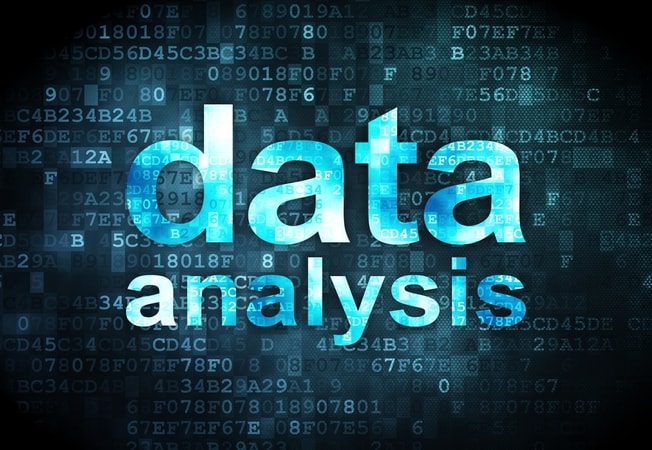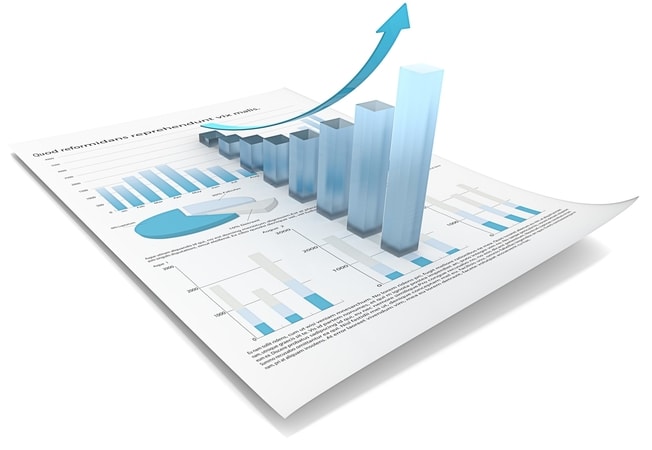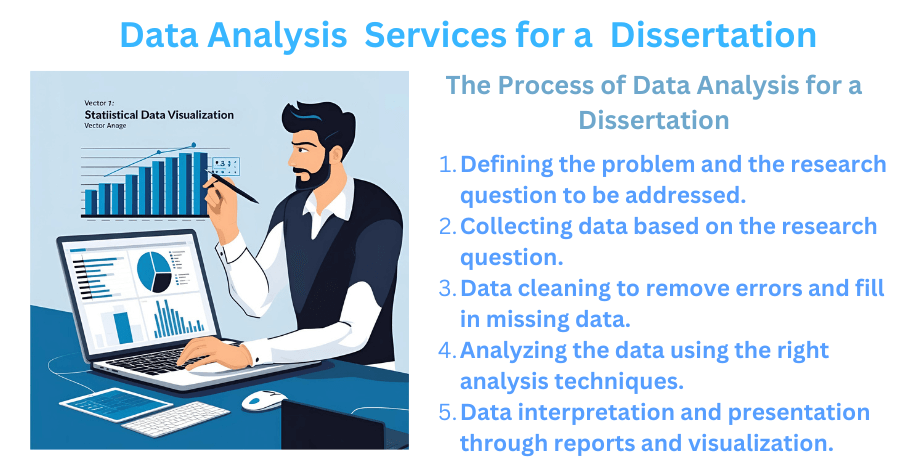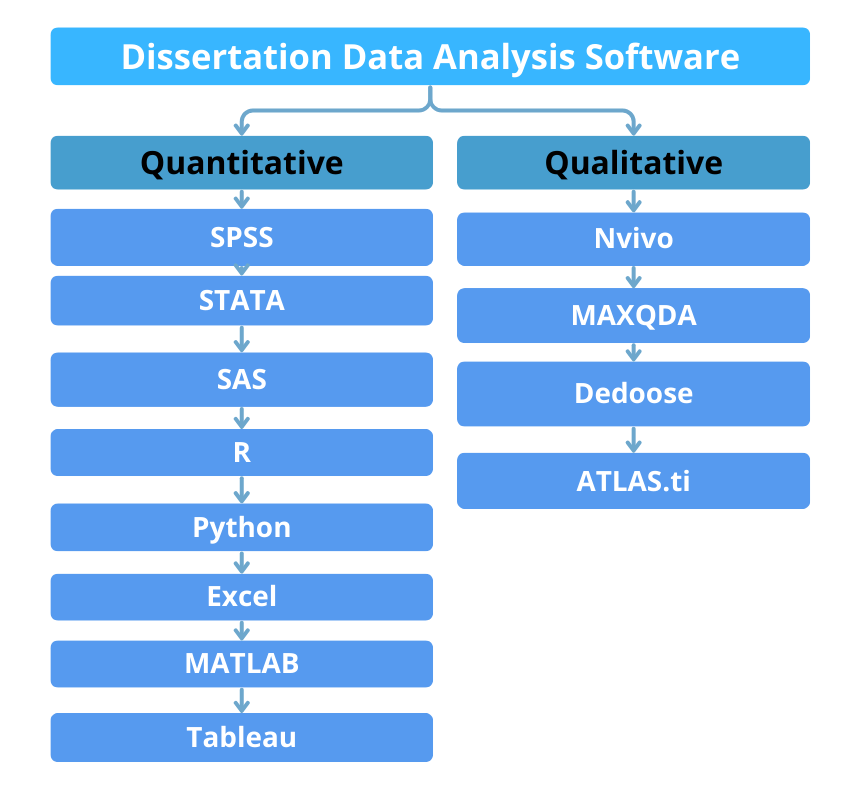Data Analysis Services for Dissertations: Research and Statistics Help From Experts
The process of organizing, summarizing, categorizing, and examining chunks of collected information to bring order, meaning, and structure may be time-consuming and challenging, especially owing to the fact that most scholars and students are expected to complete and submit research papers and projects alongside other commitments, hence, the need for professional data analysis services for a dissertation to meet the strict deadlines. Dissertation data analysis can be conducted to achieve different objectives, including finding answers to posed research questions, solving problems, or data mining to unravel themes and patterns of interest. When providing professional dissertation data analysis help, one must be sure to remain unbiased and open-minded toward unexpected patterns, results, or expressions.
Our company comprises experienced dissertation data analysts for both qualitative and quantitative data types. We possess the relevant data analysis techniques necessary for breaking the large chunks of the information gathered to provide answers and solutions to research questions and problems. This article provides information on the factors we consider when providing services to those who seek data analysis help for their research from us.
Considerations When Offering Dissertation Data Analysis Services for Research
Our dissertation data analysis process is founded on various steps and considerations. We provide quality help with data analysis for clients with varying target audiences, including dissertation committees for learning institutions, business operations managers, and supervisors of capstone projects, among others, based on research objectives for each client. We provide the best data analysis using SPSS, STATA, or R Studio and other qualitative and quantitative techniques to disseminate the results for academic, professional, and business operations purposes. Some of the factors we consider when analyzing data for a dissertation include:
1. Purpose, goals, and objectives of the analysis
The reasons behind data analysis in research depend on the target audience and what they want to do with the results or findings. We can analyze data for a student to present the work before a dissertation committee for grading and award of a degree or for an organization to identify patterns and issues with business operations and derive concerned insights for resolving situations and fixing problems with the company's revenue. The entire process of data analysis is influenced by the aims and objectives that the client wants to achieve. Regardless of the goals or objectives to be achieved, one can get expert dissertation data analysis services from our company at an affordable price.
2. The research design adopted in data collection
The common research designs include qualitative, quantitative, and mixed methods. The different designs lead to the collection of varying data types which differ in analysis needs. Students writing qualitative projects and research papers collect data in the form of descriptions, words, images, symbols, and objects. To analyze qualitative data, we use manual methods where one reads the document while noting down commonly used or repetitive words for insights on patterns and themes.
Quantitative research design entails collecting numeric data and analyzing it using statistical tools, software, and packages to make inferences regarding the questions, objectives, or problems presented in the research proposals. We must, therefore, understand the research design and the methods of data collection used because they affect the data types and nature of variables to be measured or analyzed.
3. Data validation, editing, and coding
Before conducting statistical analysis on quantitative data for a dissertation, we prepare it through validation, editing, and coding. We conduct data validation to verify whether it was collected according to the set standards or if it contains biased responses. During validation, we screen the data for ethical standards and procedural compliance, fraud, and completeness. Editing entails checking for errors, missing values, and outliers to get the data ready for analysis. In data coding, we group and assign values to the responses to make them easier to analyze. After preparation, we provide the best data analysis using SPSS, STATA, or R Studio to those who hire professionals from our company.
4. The appropriate statistical test to analyze data for research
Statistical analysis of the collected data requires a careful selection of the most appropriate test to run on it to report the correct and reliable findings. Selecting an appropriate test to produce the correct data analysis results is based on careful consideration of other factors, such as:
(a). The research question/hypothesis
To choose the most appropriate tests for quantitative data analysis, one must clearly understand how the research questions or hypotheses are phrased. The hypothesis or research question posed provides insights into the types of variables and how they are being measured during the study. One can get help from expert dissertation data analysts from our company to determine whether the questions to be answered or problems to be solved align with the research objectives.
The research aims and objectives may be to predict the membership or score of a particular group, determine differences between treatments or groups, or study the relationships or associations between variables in the collected data. Depending on the aims and objectives of analyzing the research data, one may use different statistical tests such as regressions, correlation, Chi-square, t-tests, or analysis of variance (ANOVA) to obtain correct and reliable results.
(b). Type and nature of the collected data
The choice of tests in statistical data analysis is further influenced by the nature and type of the research data collected. The primary data types can be divided into qualitative, quantitative, and categorical.
Qualitative data does not require statistical methods of analysis, appears in descriptions and words, and is collected through methods such as focus groups or personal interviews, among others. We offer qualitative data analysis services for research using methods such as:
- narrative analysis,
- content analysis,
- discourse analysis, and
- grounded theory.
We provide excellent exploratory data analysis to help in qualitative research to find patterns and themes with regard to the research questions or objectives. The patterns and themes revealed from qualitative data processing should be relatable back to the literature review, the questions, objectives, and hypotheses presented in the introduction chapter of the research paper or project.
Quantitative data analysis entails using descriptive and inferential statistics to draw conclusions, test hypotheses, and estimate parameters from sample research data to an entire population from which the sample was drawn. The type and nature of data gathered in research determine whether one uses statistical tools or not and what tests are the most appropriate to run on it for the best analysis results.
(c). Level of measurement of variables
Variables in research can be said to be categorical, continuous, dichotomous, or discrete. Based on the levels of measurement, variables can be nominal, ordinal, interval, or ratio. Our statistical consultants examine the levels of measurements for the variables present in the research data to determine the most appropriate test to run to report the correct results.
(d). Assumptions of the statistical tests
The data analysis plan should provide the assumptions of specific statistical tests. The assumptions for some of the statistical tests include normality of distribution, homogeneity of variance, and the presence of outliers and missing data. Understanding the assumptions for each possible statistical test is essential to ensure the accuracy and correctness of the findings or results reported from the data analysis section of the dissertation, and specifications on what to do in case the assumptions are violated.
5. Choosing the right data analysis software for your research
Our analysts are experts in different statistical software and packages, including STATA, SPSS, and R Studio. Graduate students wishing to hire someone to analyze data for a dissertation on their behalf can rest assured of the best, most accurate, and most reliable results after ordering our services. In addition to the analysts, our company comprises qualified writers for each dissertation chapter or the entire paper. We effectively write dissertations and deliver excellent data analysis help using carefully and logically selected software and statistical models owing to the vast experience gained over the years.
Each data analyst in our company understands what buttons to press in order to test for the assumptions with respect to the chosen statistical test, the possibility of making corrections if the assumptions are violated, sorting outliers and missing data, or choosing between graphical and numerical approaches to analysis. The dissertation or thesis data analyzed by our experts yields correct and reliable results that we report in the findings chapter of the research project or paper.
6. Sample size and statistical power analysis
It is imperative to conduct a power analysis after determining the statistical test to use. The power analysis is aimed at determining the appropriate sample size for a statistical test when the alpha level and the actual sample size are known. The minimum required statistical power of a study is 80% and explains the probability of detecting differences or relationships when they are actually present in the data. Those who purchase the services of a data analyst from our company are assured of the correct power analysis that determines the appropriate sample size to detect statistically significant differences or relationships between groups or treatments, if any.
Other factors that we consider in our data analysis services for a dissertation include objectivity and bias, accuracy, and reliability of the findings, data visualization, and statistical errors. Both quantitative and qualitative projects' data analysis needs are catered for in our services. Those wishing to hire someone to conduct data analysis for research can place orders through our company website at any time of their convenience, 24/7. We provide excellent data analysis integration with the literature review chapter of the dissertation to enhance the credibility of the research and the reliability of the findings. We also offer other services such as rewriting, editing, and proofreading dissertations and theses.







